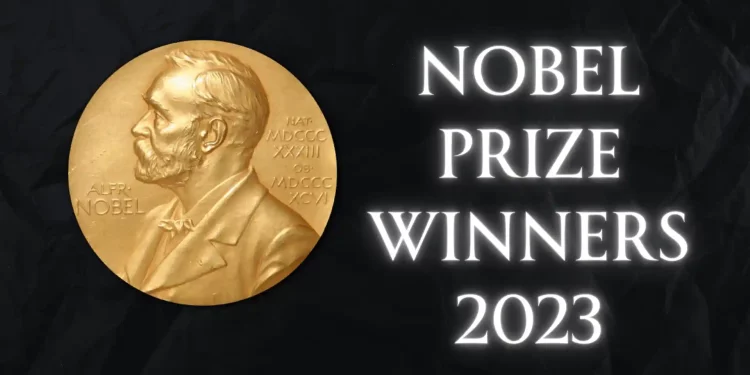The Nobel Prizes for 2023 were awarded in a ceremony in Oslo, honouring outstanding contributions across various fields. As the world acknowledged the brilliant achievements of Nobel laureates across the fields of physics, chemistry, medicine, literature, peace, and economics, the absence of Peace laureate Narges Mohammadi served as a stark reminder of the challenges faced by human rights activists globally.
Nobel Prize for Medicine: Revolutionising Vaccine Development
The prestigious Nobel Prize for Physiology or Medicine has been awarded to Hungarian scientist Katalin Kariko and her US colleague Drew Weissman. Their groundbreaking work, dating back to 2005, achieved a breakthrough in messenger RNA (mRNA) technology. The laureates’ research, including “nucleoside base modifications,” played a crucial role in the development of highly effective mRNA vaccines against COVID-19.
The laureates’ contributions became the cornerstone for the development of the Pfizer-BioNTech and Moderna COVID-19 mRNA vaccines. The Nobel Assembly of Sweden’s Karolinska Institute Medical University highlighted their role in the “unprecedented rate of vaccine development during one of the greatest threats to human health in modern times.”
Nobel Prize for Physics: Illuminating the Microscopic World
The Nobel Prize for Physics recognised the groundbreaking work of Pierre Agostini, Ferenc Krausz, and Anne L’Huillier. These scientists delved into the microscopic world, generating ultra-short pulses of light that provide snapshots of changes within atoms. This research could pave the way for better disease detection from simple blood samples.
Eva Olsson, from the Nobel Prize in Physics Selection Committee, explained the significance of their work, stating, “The ability to generate attosecond pulses of light has opened the door on a tiny, extremely tiny, time scale and it’s also opened the door to the world of electrons.”
Nobel Prize for Chemistry: Quantum Dots’ Impact on Nanotechnology
In the realm of nanotechnology, the Nobel Prize in Chemistry celebrated the pioneering achievements of Alexei Ekimov, Louis Brus, and Moungi Bawendi. These laureates pioneered work on a microscopic scale, leading to the creation of quantum dots.
Quantum dots, luminescent nanoparticles made of semiconductors, are now integral in various applications, from computer monitors and TV screens to LED lamps and cutting-edge techniques for mapping biological tissue.
Nobel Prize for Literature: Artistic Tapestry
The Nobel Prize in Literature for 2023 has been bestowed upon Norwegian author Jon Fosse. Fosse is a famous author whose work has been translated into 40 languages, and whose style has been described as minimalist. His large body of work, which includes plays, novels, poetry, essays, and even children’s books, ranks as some of the most performed globally.
Anders Olsson, a member of the Swedish Academy, praised Fosse’s ability to touch on the deepest human feelings, anxieties, insecurities, and questions of life and death. Fosse’s impact is evident in over 1,000 productions of his plays and the universal resonance of his work.
Nobel Peace Prize: Narges Mohammadi’s Courage Amidst Adversity
The Nobel Peace Prize for 2023 was awarded to Iranian women’s rights activist Narges Mohammadi. Currently serving multiple prison sentences in Tehran for crimes including propaganda against the state, Mohammadi’s unwavering commitment to human rights and freedom has earned her global recognition. The prize also acknowledged the broader movement in Iran, particularly the hundreds of thousands who demonstrated against discriminatory policies.
The Nobel Peace Prize was accepted on behalf of Mohammadi by her teenage twins, Kiana and Ali Rahmani. The 51 year old activist is currently serving a 31 year prison term, and her children delivered her speech which had been smuggled out of prison.
Nobel Economics Prize: Claudia Goldin’s Insights into Gender Disparities
The Sveriges Riksbank Prize in Economic Sciences in Memory of Alfred Nobel was awarded to Harvard Professor Claudia Goldin for her groundbreaking research on women’s labour market outcomes. Goldin is renowned for studying more than 200 years of data to analyse earnings and female labour participation.
Goldin’s work has shown that the Industrial Revolution caused a dip in female labour participation, and only recovered after the onset of the modern service economy. Her research has revealed important insights into the gender gap, factors causing persistent disparities, and women’s labour roles. In conclusion, the Nobel Prizes for 2023 paint a vivid tapestry of human achievement. From the molecular realms explored by physicists to the artistic landscapes crafted by literary minds and the courageous advocacy of individuals standing against oppression, each laureate has left an indelible mark on the fabric of our collective human history.


















